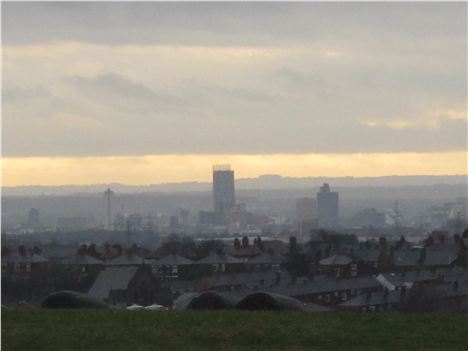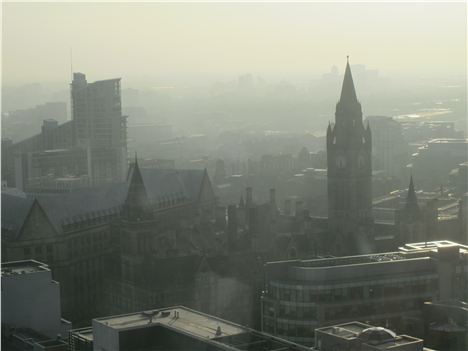TWENTY-five degrees Celsius. Residents of the Rainy City are spread prostrate over the parched grass of Piccadilly Gardens.
In the book, one trafficking victim is forced to drink vinegar as a punishment for trying to escape. This is based on just one harrowing real-life example
AK Nawaz is running a few minutes late for our interview. Hurried and sweating, he lurches into Salvi's in Exchange Square apologising effusively as if he'd just driven over a family pet.
A journalist based in the north west for several years (who has begged us not to use his real name. "It will piss off too many people. Police officers, my mother-in-law..."), we're meeting to discuss his Manchester-based crime thriller The Cotton Harvest.
Dishevelled, but with a likeable, lived-in face, you'd wouldn’t think Nawaz was the sort to graphically describe victims being boiled alive by human traffickers.
You'd be wrong.
The debut novel follows a rookie British Asian policeman roped into a sex trafficking investigation and - following twists which include a rogue property deal, a psychopathic Glaswegian sergeant, and a string of mysterious A&E admissions - ends up uncovering the terrible secret of 'The Beswick Religion' within an east Manchester's housing estate.
Manchester: something nasty down there lies
Without giving too much away, it's a story drawing heavily on the city 's industrial heritage. But also it’s a convincingly portrait of post-recession Manchester, with all its varied contradictions of wealth and poverty.
It's a gritty, assured thriller for a first-time novelist. But there's a catch: Nawaz hasn't got a book deal.
He doesn't even have a book.
Instead, he's followed the path of thousands of wannabe writers hoping to be the next JK Rowling (or even EL James) by publishing as an e-Book.
Normally, Confidential wouldn't have bothered. But we were persuaded by the novel's intriguing concept, the unusual take on Manchester's history, and - as Nawaz puts it - the rare appearance of an Asian lead character in British crime fiction...
Why did you write this novel?
I think Manchester has been under-used as a setting for crime fiction. There are some very fine writers such as Sophie Hannah, Bill Rogers and Val McDermid who have successfully used Manchester as a landscape to their stories.
Having reported on crime and social problems in Manchester for a number of years, I did feel there were certain elements about life in the city - including aspects of its unique history and current status as England's northern capital - which weren't being captured. Things which feature in my story, such as the knock-off clothing shops in Cheetham Hill, the people who sleep under railway arches, or the brothel-saunas which seem to operate in a legally grey area, are part of the fabric of the place. I wanted to recreate what Ian Rankin or William McIlvaney had achieved, in being able to make the cities they wrote about intense, dark and dangerous... almost like extra characters in the plot.
City mystery
I've read the book. It's pretty brutal in places, isn't it?
[Laughs] Yeah, I guess so. One of the characters is a human trafficker who specialises in boiling his victims alive - and obviously one of the central themes is... how to describe without spoiling it, pretty violent but unique to Manchester. But I don't think it's gratuitous and there's a bit of light relief thrown in there as well.
You’re lead character isn’t a middle aged, white cop – but a young Asian policeman. Why aren't Asian characters better represented in crime fiction?
I didn't set out to specifically write a novel about an 'Asian cop'. It just turned out that way. The character of Khorum is based largely on a friend, who is a complicated but fundamentally decent guy. I do think, as in many aspects of the media, there isn't great representation across ethnic minorities generally. Probably this division is accentuated among South Asian communities as many of the brightest kids are encouraged to follow professional careers in law, engineering, medicine or whatever. Jobs such as writing or journalism are still, among some families, not seen as entirely respectable. It’s a shame because certain characters and scenarios and ways of life won’t enter the mainstream media.
The novel focuses on sex trafficking. What research did you do into this area?
I've written articles about human trafficking. There have also been a number of high profile cases in British courts in recent years. Although all the characters which appear in the story are obviously fictitious, there are a number of themes such as the way young women are flown or bused into the country on the promise of work and the conditions they are kept in which have a real-life precedent. In the book, one trafficking victim is forced to drink vinegar as a punishment for trying to escape. This is based on just one harrowing real-life example... and it’s sobering to hear from police and support workers who are trying to stamp out the problem.
It has been published as an e-book, how come?
I finished the book nearly two years ago and have spent the last 18 months re-writing and writing off to agents and publishers. Although the response was overwhelmingly positive, and I got into advanced talks with a couple of agents, my feeling was that people were at a bit of a loss about how to market something that wasn't a straight-forward crime novel.
Because of the pressure of online and supermarket discounting, the margins in publishing have become pretty tight and I think it's harder to persuade the industry to take a chance on something that's a little bit different.
I've taken all of the suggestions on board and feel that it's a well-written, tight read and absolutely the best I can make it. I've priced it at a pretty low 1.99 - which, from my completely biased view, I think is good value for a good read.
That having been said, pitching to agents and publishers has been a great learning experience - and I've made a lot of contacts who I plan to pester again for book two.
On that very subject, at the end of your book it becomes clear you intend it to be the first in a series. Can you say what will happen next?
No, because I've only just started writing it. As he starts to climb the ranks, Khorum will probably start to encounter a more subtle, systemic form of racism within the force than he has so far encountered. We’ll learn more about why Soft Bob [the novel’s comically violent Scottish policeman] was forced to leave Glasgow. Probably there’ll be a lot more violence too, if I’m being honest…
Buy a Kindle copy of The Cotton Harvest here (£1.99).













